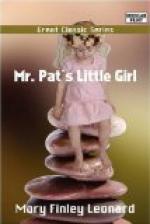Presently it occurred to her that her grandmother might have been vexed at her carelessness in leaving her book on the grass. It was careless; father would have said so. Well, she could let grandmamma know she was sorry, and feeling relieved at having found a possible solution of the problem, she closed the spelling book.
Mrs. Whittredge looked up in evident surprise when Rosalind entered the room and announced, “I am sorry I left my book on the grass, grandmamma.”
“What do you mean, my dear?” she asked.
“I thought you didn’t like it because I was careless.”
“I suppose it was careless, my pet, but I had not thought of it. But tell me what makes you care so much for that book. It seems to me there are many stories that would be more interesting to a little girl. Suppose you put it away and let me find you something else.”
The color deepened in Rosalind’s face. “It is my own, own book,” she cried, clasping it to her heart.
“Very well, you need not be tragic about it,” Mrs. Whittredge said coldly, turning to her writing.
Again Rosalind knew she had offended, and this time her resentment was aroused. “I don’t like to be spoken to in that way,” she told herself, as she walked from the room.
Before she had reached the head of the stairs her grandmother’s voice called her hack. Reluctantly she returned.
Mrs. Whittredge had risen and now came to meet her and put her arm around her, and her voice was soft and full of affection as she asked, “Do you want to go to the cemetery with me this afternoon, pet? Aunt Genevieve has the carriage, and I think a walk will do me good.”
The walk along the shady street and through the grassy lane to the gate at the foot of the hill was as pleasant as a walk could be that summer day. Rosalind kept sedately by her grandmother’s side, and the face under the drooping hat was grave. Behind them walked Martin with some garden tools and a watering-pot.
The serious eyes brightened, and the lips curved into a smile at sight of Maurice and Katherine playing dominos under the maple. How lovely it must be to have a brother or sister to play with and talk to!
The cemetery was not new to Rosalind, for Mrs. Whittredge on her daily drive usually stopped there, and its winding paths and green slopes, its drooping willows and graceful oaks, and the flowers that bloomed everywhere, around the stately shafts of marble and the low headstones, seemed to her very pleasant. Here, however, her grandmother’s sadness took on a deeper tinge as she moved among the mounds that lay in the shadow of the massive granite monument with “Whittredge” in letters of bronze at its base.




